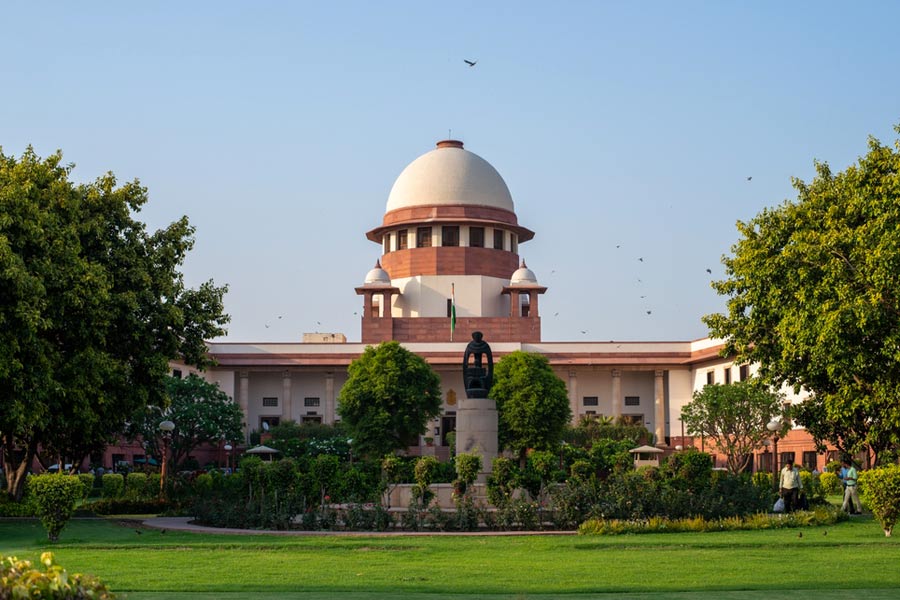The Supreme Court on Tuesday gave the Centre a month’s time to come out with guidelines to prevent arbitrary search and seizure conducted by investigating agencies against journalists, saying the “State cannot be run only through its agencies”, and termed a “serious matter” the perceived unbridled powers of the government.
The bench of Justices Sanjay Kishan Kaul and Sudhanshu Dhulia told additional solicitor-general S.V. Raju, who appeared for the Centre, that the court itself would formulate the guidelines if necessary but would prefer the government to come out with steps to check the arbitrary exercise of power by the police, Enforcement Directorate and the CBI.
“Mr Raju, I am finding it very difficult to accept some kind of all-within power that the agencies have. This is very dangerous. You must have better guidelines,” Justice Kaul, who headed the bench, told the ASG.
“If you want us to do it, then we will do it. But my view is that you ought to do it yourself. It is time that you ensure it is not misused. It can’t be a state that’s run only through its agencies. We will give you time, no difficulty. But you must analyse what kind of guidelines are necessary to protect them…. There should be better guidelines for media professionals. Media professionals have their own sources. We have held the right to privacy a fundamental right. There should be a balance,” Justice Kaul added.
The bench made the observations while dealing with a PIL filed by the Foundation for Media Professionals seeking guidelines to prevent arbitrary search and seizure of digital records, laptops, mobiles and computers by the investigating agencies, which it said had a “chilling effect” on the freedom of speech and expression enjoyed by the fourth estate.
Senior advocate Siddharth Agarwal, appearing for the organisation, said there were hundreds of journalists whose digital devices had been taken away en masse.
“There are no guidelines as to when and what can be seized. The entire digital footprint is on that one device. Once an investigating agency is involved, it is not that a person can have a backup,” Agarwal submitted.
Raju countered the arguments, saying there were enough safeguards in the existing laws under which a person could safely have backup files of the data seized.
Justice Kaul said: “These are media professionals who will have their own sources and other things. There must be some guidelines. If you take everything away, there’s a problem. You must ensure there are some guidelines.”
Raju said the investigating agency had a duty to examine the data seized. “You cannot shut out the investigating agency completely and totally… there may be some anti-national elements. Media cannot be above the law,” the ASG argued.
The ASG said there were several complicated issues that were required to be examined before suitable guidelines could be formulated.
Agarwal said the provision was being misused by all political dispensations irrespective of party affiliations, prompting the bench to say: “One dispensation teaches the other.”
Later the bench passed the following order: “We have put to the learned ASG that there has to be a balancing of interests and proper guidelines need to be in place to protect the interests of media professionals.”
“We would like the ASG to work on this aspect and come back on this issue. This is more so in view of the aspect that privacy is held to be a fundamental right by this court…,” the bench added while referring to the ruling of the Supreme Court in the Justice K.S. Puttaswamy Vs Union of India case (Aadhaar card row) wherein it was held that the right to privacy was a fundamental right.
The present petition, filed through advocate Rahul Narayan, had pleaded that the spectre of being compelled by law enforcement agencies to hand over one’s digital devices containing not only sensitive personal data but also confidential professional information cast “a serious and indelible chilling effect across society generally, and the journalist community more specifically which has been rendered unable to fully exercise its basic constitutional freedom of speech and exercising one’s profession”.
Since there is no protection in the existing laws like the CrPC, the Foundation for Media Professionals wants the court to issue guidelines to fill the lacuna until the legislation is passed.










